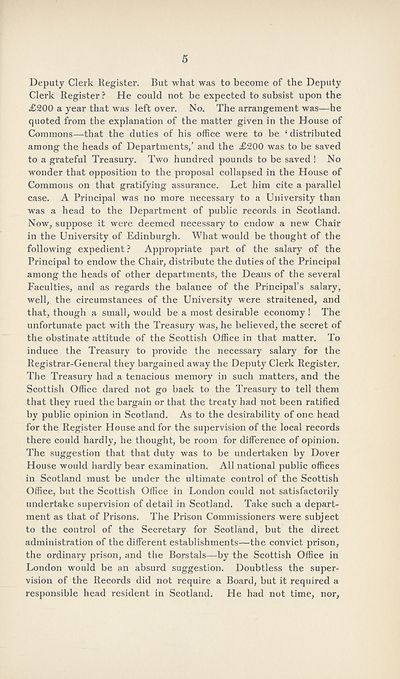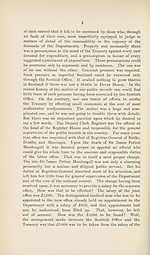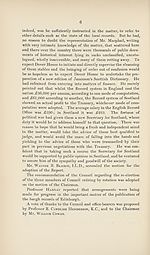Series 3 > Foreign correspondence with Marie de Lorraine, Queen of Scotland, from the originals in the Balcarres papers > Volume 7
(408) Page 5
Download files
Complete book:
Individual page:
Thumbnail gallery: Grid view | List view

5
Deputy Clerk Register. But what was to become of the Deputy
Clerk Register? He could not be expected to subsist upon the
£200 a year that was left over. No. The arrangement was—he
quoted from the explanation of the matter given in the House of
Commons—that the duties of his office were to be ‘ distributed
among the heads of Departments,’ and the £200 was to be saved
to a grateful Treasury. Two hundred pounds to be saved ! No
wonder that opposition to the pi’oposal collapsed in the House of
Commons on that gratifying assurance. Let him cite a parallel
case. A Principal was no more necessary to a University than
was a head to the Department of public records in Scotland.
Now, suppose it were deemed necessary to endow a new Chair
in the University of Edinburgh. What would be thought of the
following expedient ? Appropriate part of the salary of the
Principal to endow the Chair, distribute the duties of the Principal
among the heads of other departments, the Deans of the several
Faculties, and as regards the balance of the Principal’s salary,
well, the circumstances of the University were straitened, and
that, though a small, would be a most desirable economy ! The
unfortunate pact with the Treasury was, he believed, the secret of
the obstinate attitude of the Scottish Office in that matter. To
induce the Treasury to provide the necessary salary for the
Registrar-General they bargained away the Deputy Clerk Register.
The Treasury had a tenacious memory in such matters, and the
Scottish Office dared not go back to the Treasury to tell them
that they rued the bargain or that the treaty had not been ratified
by public opinion in Scotland. As to the desirability of one head
for the Register House and for the supervision of the local records
there could hardly, he thought, be room for difference of opinion.
The suggestion that that duty was to be undertaken by Dover
House would hardly bear examination. All national public offices
in Scotland must be under the ultimate control of the Scottish
Office, but the Scottish Office in London could not satisfactorily
undertake supervision of detail in Scotland. Take such a depart¬
ment as that of Prisons. The Prison Commissioners were subject
to the control of the Secretary for Scotland, but the direct
administration of the different establishments—the convict prison,
the ordinary prison, and the Borstals—by the Scottish Office in
London would be an absurd suggestion. Doubtless the super¬
vision of the Records did not require a Board, but it required a
responsible head resident in Scotland. He had not time, nor.
Deputy Clerk Register. But what was to become of the Deputy
Clerk Register? He could not be expected to subsist upon the
£200 a year that was left over. No. The arrangement was—he
quoted from the explanation of the matter given in the House of
Commons—that the duties of his office were to be ‘ distributed
among the heads of Departments,’ and the £200 was to be saved
to a grateful Treasury. Two hundred pounds to be saved ! No
wonder that opposition to the pi’oposal collapsed in the House of
Commons on that gratifying assurance. Let him cite a parallel
case. A Principal was no more necessary to a University than
was a head to the Department of public records in Scotland.
Now, suppose it were deemed necessary to endow a new Chair
in the University of Edinburgh. What would be thought of the
following expedient ? Appropriate part of the salary of the
Principal to endow the Chair, distribute the duties of the Principal
among the heads of other departments, the Deans of the several
Faculties, and as regards the balance of the Principal’s salary,
well, the circumstances of the University were straitened, and
that, though a small, would be a most desirable economy ! The
unfortunate pact with the Treasury was, he believed, the secret of
the obstinate attitude of the Scottish Office in that matter. To
induce the Treasury to provide the necessary salary for the
Registrar-General they bargained away the Deputy Clerk Register.
The Treasury had a tenacious memory in such matters, and the
Scottish Office dared not go back to the Treasury to tell them
that they rued the bargain or that the treaty had not been ratified
by public opinion in Scotland. As to the desirability of one head
for the Register House and for the supervision of the local records
there could hardly, he thought, be room for difference of opinion.
The suggestion that that duty was to be undertaken by Dover
House would hardly bear examination. All national public offices
in Scotland must be under the ultimate control of the Scottish
Office, but the Scottish Office in London could not satisfactorily
undertake supervision of detail in Scotland. Take such a depart¬
ment as that of Prisons. The Prison Commissioners were subject
to the control of the Secretary for Scotland, but the direct
administration of the different establishments—the convict prison,
the ordinary prison, and the Borstals—by the Scottish Office in
London would be an absurd suggestion. Doubtless the super¬
vision of the Records did not require a Board, but it required a
responsible head resident in Scotland. He had not time, nor.
Set display mode to:
![]() Universal Viewer |
Universal Viewer | ![]() Mirador |
Large image | Transcription
Mirador |
Large image | Transcription
Images and transcriptions on this page, including medium image downloads, may be used under the Creative Commons Attribution 4.0 International Licence unless otherwise stated. ![]()
| Scottish History Society volumes > Series 3 > Foreign correspondence with Marie de Lorraine, Queen of Scotland, from the originals in the Balcarres papers > Volume 7 > (408) Page 5 |
|---|
| Permanent URL | https://digital.nls.uk/127218849 |
|---|
| Shelfmark | SCS.SHS.88 |
|---|---|
| Attribution and copyright: |
|
| Attribution and copyright: |
|
|---|
| Description | Over 180 volumes, published by the Scottish History Society, containing original sources on Scotland's history and people. With a wide range of subjects, the books collectively cover all periods from the 12th to 20th centuries, and reflect changing trends in Scottish history. Sources are accompanied by scholarly interpretation, references and bibliographies. Volumes are usually published annually, and more digitised volumes will be added as they become available. |
|---|


